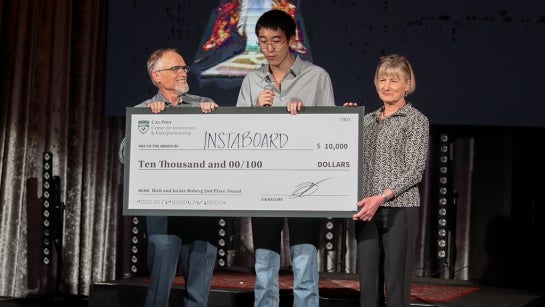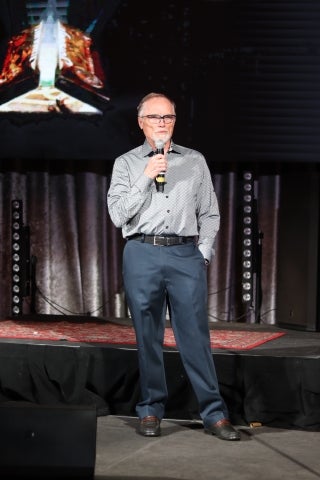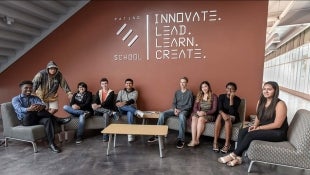Center for Innovation and Entrepreneurship: Richard Boberg

After a career working in Silicon Valley at tech startups, Rich Boberg (Electronic Engineering,‘70) is eager to support the next generation of Mustangs who are coming up with big ideas. That’s why for this year’s Poly Gives, he’s offered to match gifts to the Cal Poly Center for Innovation and Entrepreneurship, dollar-for-dollar up to $18,000.
“I love giving to the CIE because I can see the results and be directly involved with the students,” he said. “It’s not just giving money. There is an opportunity to see real impact when the students create products, services, and businesses.”

The CIE helps students and community members acquire the tools, develop the skills and cultivate the mindset of an entrepreneur so that they can create economic and social value throughout the world. Since its inception, the CIE has expanded its programming on and off campus and has raised over $250 million in capital, helped launch over 120 companies, created over 1000 jobs, and offered 26 entrepreneur courses.
After studying electronic engineering at Cal Poly, Boberg attended MIT for graduate school. His career has spanned from large tech companies like Intel to small startups, some of which eventually failed while others went on to become very successful. Through it all, Boberg leaned on the fundamentals he learned at Cal Poly.
“Theory is great, but practice is what makes things happen,” Boberg said. “When I went to MIT, I was a lab assistant in the digital lab. The guy that ran the lab had very little hands-on experience with how to debug a digital circuit. And so, I was teaching some of the MIT professors how to debug digital hardware.”
“The hands-on Learn by Doing experience was a huge boost in making my career successful," he added.
Around 2004, Boberg and fellow alums Carson Chen (Electronic Engineering, ’73) and Laura Pickering (Electronic Engineering, ’84) began thinking about how they could give back to Cal Poly. One idea they had was to help Cal Poly create more successful startups by using students’ senior projects to help mentor and finance student ideas.
“But there was no big list of senior projects,” Boberg explained. “It was all distributed amongst various professors. So, we thought, ‘Well, if we can't find the students, let's bring them to us.’”
That conversation led to the creation of Innovation Quest (iQ), an annual contest to help launch student-led startups.
The first year of the contest, about 20-30 entrants competed for three $5,000 prizes. Later, the prize money went up to $15,000 for first prize, and $10,000 and $5,000 for second and third prize, which helped jump the entrant pool up to sometimes 80 to 100 in the following years. IQ has since been folded into the CIE, and since its inception has awarded more than $400,000 in support of Cal Poly innovators and entrepreneurs who have used the program as a platform to launch successful businesses.
Boberg still acts as a judge in the competition and continues to work with and mentor some of the students long after they were in the contest. In fact, part of his matching gift this year will come from partner distributions from a past CIE student startup that he invested in more than a decade ago.
Being able to stay connected to Cal Poly and help nurture the next generation of successful entrepreneurs is important to Boberg, and one of the reasons that he continues to support the CIE and student success.
“Learn by Doing is the tip of the iceberg in terms of the advantages you get from Cal Poly,” he explained, “because you end up doing and designing real stuff. It helps create a self-confidence and knowledge that you can do almost anything.”
Help the Center for Innovation and Entrepreneurship meet his match of $18,000 during Poly Gives!

